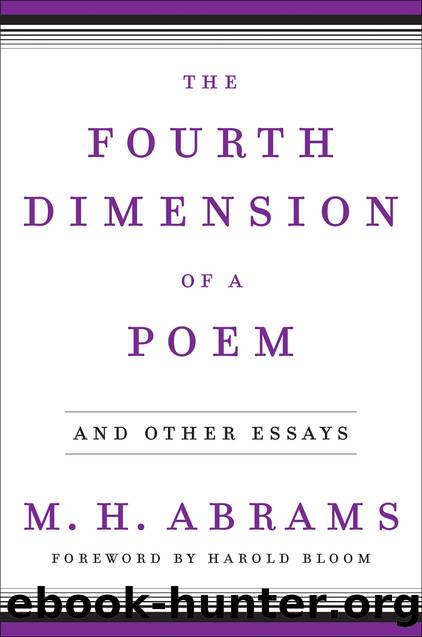The Fourth Dimension of a Poem by M H Abrams

Author:M H Abrams [Abrams, M H]
Language: eng
Format: epub
ISBN: 9780393089233
Publisher: W. W. Norton & Company
Published: 2012-08-08T04:00:00+00:00
VI
As the upshot of all these considerations, I am confirmed in my assurance that the traditional interpretation of âA Slumberâ is correct. But I am confronted by a disconcerting discovery. Certain though I am that the traditional reading is right and Daviesâ reading is wrong, I find that some of the graduate students in the seminar I described disagree with me; that my fellow director of the seminar, Max Black, disagrees with me; and that several of my literary friends also disagree with me.
What to do when, myself so certain, I am confronted by a contrary judgment by indubitably qualified readers? My first and very human impulse is to get angry. But I resist the impulse, and run again through all the reasons for my interpretation that I have formulated. When I have done this, I can do no more; I have reached the point in giving reasons at which, as the philosopher Wittgenstein put it, âthe spade turns.â If a qualified reader of lyric poems stubbornly holds to a contradictory reading, I can only wait, with what patience I can muster, for an infusion of graceâan interpretive conversionâthat will get the reader to see what to me is so evident. But upon considering the matter, I realize that such a reader feels the same way about my stubbornness in maintaining my interpretation. So I have to admit that in this, and in similar instances of interpretive deadlock, some qualified readersâ certainty will be contradicted by the certainty of other qualified readers. And by this admission, I seem to have reasoned myself into sharing the skepticism I set out to disprove: that in interpreting poems, no reading can claim to be the right reading.
At this juncture, I find illuminating observations by Ludwig Wittgenstein, which I venture to summarize in this way: Our uses of language are inter-involved with âforms of lifeââactivities which incorporate a diversity of language games that have been formed to accomplish a diversity of human purposes. Each language game operates according to a set of rules, some of which may overlap with the rules of other language games, while others are specific to its particular enterprise. In consequence of the differences in their rules, although a number of language games undertake to achieve certainty, Wittgenstein points out, âthe kind of certainty is the kind of language-game.â2
It is certain, for example, that âten divided by five equals two.â It is also certain that Newtonâs laws of motion are valid. Certainty in the language game of mathematics, however, and certainty in that of physical science depend on the application of rules specific to each. The two language games nonetheless have a common feature: both are highly specialized, designed systematically to exclude any role by individual human differences, in order to achieve universal agreement among all those who are competent players in each game.
The language game in the enterprise we call literary criticism, on the other hand, is specifically organized to allow room for the play of individual human differences.
Download
This site does not store any files on its server. We only index and link to content provided by other sites. Please contact the content providers to delete copyright contents if any and email us, we'll remove relevant links or contents immediately.
The Universe of Us by Lang Leav(14367)
The Sun and Her Flowers by Rupi Kaur(13694)
Adultolescence by Gabbie Hanna(8145)
Whiskey Words & a Shovel II by r.h. Sin(7481)
Love Her Wild by Atticus(7232)
Smoke & Mirrors by Michael Faudet(5509)
Wiseguy by Nicholas Pileggi(4586)
The Princess Saves Herself in This One by Amanda Lovelace(4510)
Love & Misadventure by Lang Leav(4357)
Milk and Honey by Rupi Kaur(4228)
Memories by Lang Leav(4172)
Good morning to Goodnight by Eleni Kaur(3807)
Bluets by Maggie Nelson(3711)
Too Much and Not the Mood by Durga Chew-Bose(3695)
Algedonic by r.h. Sin(3502)
Pillow Thoughts by Courtney Peppernell(3397)
The Poetry of Pablo Neruda by Pablo Neruda(3367)
HER II by Pierre Alex Jeanty(3170)
Stuff I've Been Feeling Lately by Alicia Cook(3055)
